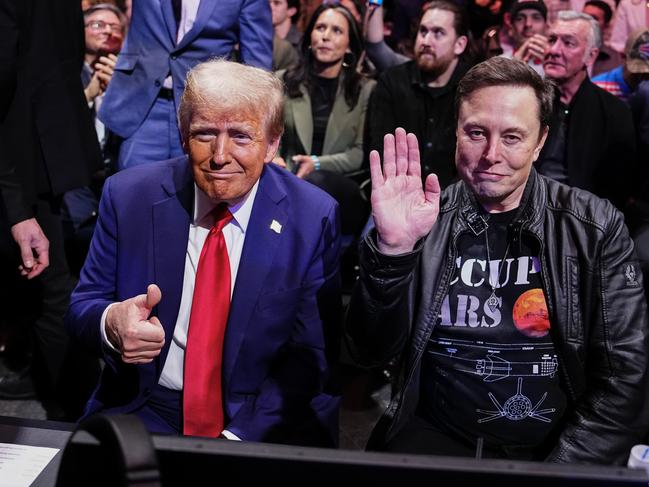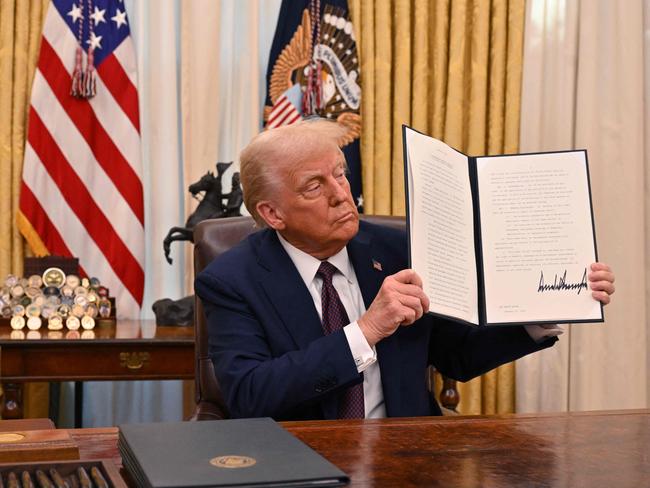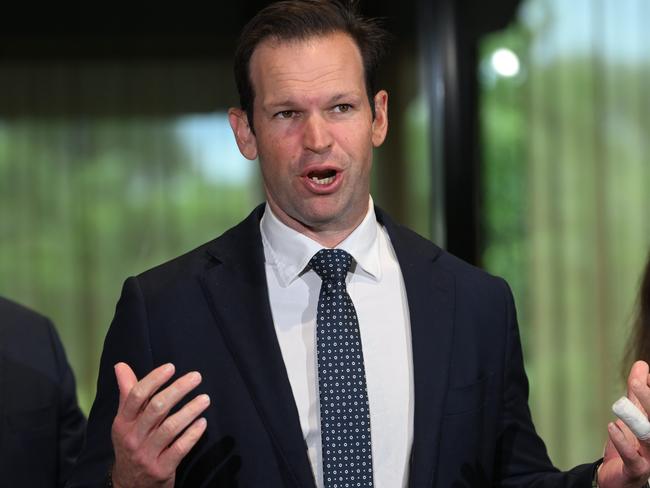James Morrow: Why Australia needs to create a DINGO
Canberra could learn a trick or two from President Donald Trump’s new administration, particularly when it comes to cutting our own bloated public sector, writes James Morrow.
Opinion
Don't miss out on the headlines from Opinion. Followed categories will be added to My News.
After four years in exile, Donald Trump returned to Washington knowing exactly what he wanted to do and precisely how he wanted to do it.
Like a steamroller hooked up to an F1 engine (with the Village People pumping from the stereo for good measure), the once and now returned president wasted precisely zero time taking aim at a swathe of targets he believes are holding the US back from enjoying a new great American century.
But while some Australians have looked on with horror at Trump’s attacks on woke DEI programs, open borders policies, and the apparatus of the deep state he blames for cruelling his first term, others now wonder if Canberra could learn a trick or two from the new administration.
Particularly when it comes to cutting our own bloated public sector.
They want to see Australia mimic Trump’s bureaucracy busting Department of Government Efficiency, or DOGE for short.
“It’s a great idea for Australia, we need it, it shows great vision from the Trump administration,” Daniel Wild, Director of Research at the free market Institute of Public Affairs think tank.
“The only way we are going to get out of our economic problems is by growing our economy, and the way you do that is by cutting red tape and getting government out of the private sector.”

DOGE (pronounced with a soft ‘g’, dohj, like the heads of state in the old Venetian Republic) started almost as something of a joke.
Originally an Elon Musk thought bubble, the abbreviation was a play on a global meme sensation from 2013 centred around a goofy Shiba Inu dog that more recently got a second life as a cryptocurrency coin.
So far, so very dorky and online.
Yet for the US, with its US$1.9 trillion-with-a-T annual budget deficit and almost incomprehensible US$30 trillion public debt, also so very necessary.
President Trump formalised the idea of a Department of Government Efficiency back in November, saying it would provide advice from “outside of government” and provide recommendations about how to “slash excess regulations, cut wasteful expenditures and restructure federal agencies.”
Within hours of taking the oath of office, Trump called the thing into being via Executive Order, placing Musk at the helm.
Wild says that that IPA research found the Australian government employs over 100,000 bureaucrats “who are dedicated to enforcing red tape,” underlying the need for a local DOGE equivalent.
Cutting this army of public servants would pay benefits both to “small businesses trying to get ahead”, says Wild.
It would also, he says, liberate the resource sector which “is being hampered by intervention despite this being where our wealth comes from as a nation, and has come from since settlement.”

Back in the US, there is already evidence that the Trump 2.0 approach to regulation is attracting big dollars.
At a White House press conference this past week the president was joined by three AI chiefs who announced a US$500 billion investment in new artificial intelligence data centres.
And while resource projects are continually stymied in Australia by what Wild says are often “ideological” objections, it has also been reported Hancock Prospecting mining billionaire Gina Rinehart is on the move in the US, looking for new mining, oil and gas opportunities in America’s far more business friendly climate.
Nor is it just about investment.
It is also about the future health of our bottom line and our ability to maintain our enviable standard of living.
Local DOGE lovers point out that while our deficits are nowhere near America’s supersized fiscal monsters, this year’s expected A$27 billion shortfall is only expected to grow in coming years.
Cost of living relief (which often amounts to handing our own tax money back to us), public sector wage hikes, and a care sector that is ballooning thanks to the NDIS means that the public sector now accounts for 27.9 per cent of GDP – a historic high.
Add in government subsidies for green energy (a few days ago the prime minister handed $2 billion to the aluminium industry to help it cut carbon emissions) and the $22.7 billion Future Made in Australia program and, as the saying goes, pretty soon you’re talking about real money.
The problem, economists say, is that not only does all this freewheeling spending make inflation incredibly “sticky”, keeping interest rates up, but it also crowds out the private sector, making it all but impossible to boost productivity.
“We needed a DOGE here yesterday, but it is even more important today as Donald Trump is deregulating and revitalising the American economy,” says Queensland LNP senator Matt Canavan.
“If we don’t respond, we’re going to be left behind … the investment, the jobs will go to a revitalised United States, where they’re cutting taxes, cutting regulation, cutting red tape, cutting spending.”
“If we are serious about maintaining our nation’s prosperity we can n o longer complacently rely on a mining boom that is fast dissipating and replace that with an investment boom.”
Canavan says that any Australian DOGE (he recently proposed a local version, Department of Implementing No Government Overreach, or DINGO for short) should start by slashing pointless bureaucratic agencies and woke regulatory regimes.

“The Workplace Gender and Quality Agency is exactly the kind of DEI pen pushers that we should scrap. This agency exists to force businesses to fill out forms instead of focusing on doing things better.
“They are a complete waste of time and are at the heart of why our nation’s economic performance is so woeful at the moment.”
He adds that the $44 billion and growing annual spend on the NDIS needs to be fixed because it is being “rorted”.
“The worst thing we can do for disabled people is lose control of this scheme and see it gutted in years to come”
But for reformers there is a further, more political problem.
Reform – cutting the size of government and government largesse – means winners and losers.
Liberals still wince at the political fallout from then-treasurer Joe Hockey’s 2014 Budget, possibly the last gasp of what had previously been a bipartisan effort to make Australia’s economy run more efficiently under Bob Hawke, Paul Keating, and John Howard.
To put it simply, everyone wants less government but nobody wants less stuff.
“They really seem to understand the politics of the situation,” says Dr John Humphreys, chief economist at the Australian Taxpayers Alliance.
“It’s easy for an economist like me to say ‘decrease the size of government’, but then you get caught in these big debates about who’s going to be left behind.”
“I think the realy smart thing they have done is have the conversation about this in two parts, separating front line workers like nurses and teachers from the size of the bureaucratic state, which is where the real problem lies.”
Humphreys believes that unlike previous efforts to rein in bureaucracy, DOGE has a greater chance of success because it is being led not by bureaucrats, but people outside government.
If DOGE works, he says, the benefits will not be just to the bottom line, but to democracy itself.
In both Australia and the US, he says, “the bureaucratic state has gotten to the point where most decisions are made by bureaucrats, not elected politicians.”
“So the poor voters are sitting there desperately trying to change our politicians and as we do that, the bureaucrats stay exactly the same.”



